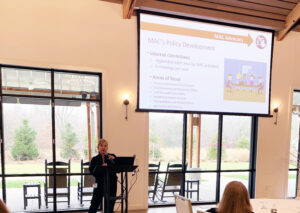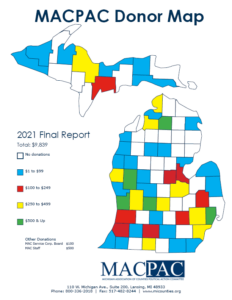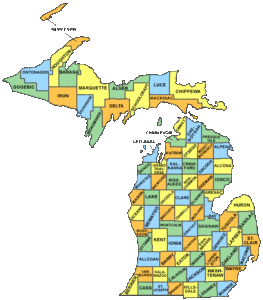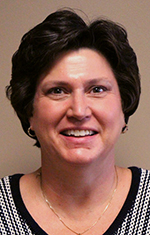Big increase for counties from liquor tax advances from Senate
 A two-bill package designed to extend the capture of liquor tax revenue that counties use for substance abuse programs passed the Senate this week. Senate Bills 1222-23, by Sen. Wayne Schmidt (R-Grand Traverse), would amend the State Convention Facilities Authority Act to extend the sunset on the capture of liquor tax revenue for improvements to the convention facility in Detroit and therefore extend the sunset on the collection of liquor tax revenue for counties.
A two-bill package designed to extend the capture of liquor tax revenue that counties use for substance abuse programs passed the Senate this week. Senate Bills 1222-23, by Sen. Wayne Schmidt (R-Grand Traverse), would amend the State Convention Facilities Authority Act to extend the sunset on the capture of liquor tax revenue for improvements to the convention facility in Detroit and therefore extend the sunset on the collection of liquor tax revenue for counties.
The issues were tied together when the act was created. Under current law, the collection and allocation of the liquor tax revenue expires once the bonds for the convention facility are paid off. Due to recent increases in liquor tax revenue, those bonds are scheduled to be paid off 13 years early, which would eliminate the future collection of revenue and deplete the allocation to counties. This two-bill package does not extend the 2039 deadline for the bonds to be paid off, but it does allow the facility authority to issue additional bonds for improvements.
MAC has been working with representatives from the authority to address our need to have counties’ annual allocation reflective of the collection of the liquor tax revenue. Current law states counties receive an increase in their allocation based on a percentage above the previous year’s allocation, not on a percentage of the total tax collected. The excess tax collected is instead allocated to the reduction of the bond debt of the authority. (Again, due to the increase in liquor tax revenue, those bonds are scheduled to be paid off early.)
By allowing the authority to issue additional debt for improvements, the bills do something significant for counties. Beginning in 2023, the baseline allocation in liquor tax dollars for counties will increase by approximately 48 percent. The annual increase will remain the same as current law of 1 percent additional each year, but the baseline will be reset every three years to reflect the increase in revenue from the liquor tax.
Also, current law states 50 percent of the liquor tax revenue received by counties must be allocated to substance abuse programs. SBs 1222-23 will change that requirement to 40 percent (though no less than the amount allocated in FY22). In short, this will be a significant increase in funds toward substance abuse programs and an increase in the amount counties can allocate to their general funds.
The bills received bipartisan support in the Senate and now move to the House for consideration next week.
For more information on this issue, contact Deena Bosworth at bosworth@micounties.org.
Mental health privatization fails in Senate, but threat still looms
 Legislation to privatize control of local mental health services, opposed by MAC, was defeated Tuesday in a surprise vote in the Senate.
Legislation to privatize control of local mental health services, opposed by MAC, was defeated Tuesday in a surprise vote in the Senate.
Senate Bills 597 and 598, by Sens. Mike Shirkey (R-Jackson) and John Bizon (R-Calhoun), were rejected by votes of 15-17 and 15-19, respectively.
These bills would have shifted financial administration of Medicaid mental health services to private Medicaid health plans, taking away public accountability and local governance and replacing it with for-profit private insurance companies.
However, there is still potential for a deal that would insert the language from SBs 597-598 into an already introduced House bill, keeping the possibility of mental health privatization at play in the current lame duck session.
MAC opposes any attempt to shift toward privatization of our local public mental health system, and we urge members to contact their legislators to share their opposition as well.
For more information on this issue, contact Samantha Gibson at gibson@micounties.org.
Expect toolkits and more in 2023 on opioid settlement resources
 As anticipation for opioid settlement dollars increases, there are numerous resources that counties can expect to see to support the decision-making processes associated with spending. Early in 2023, counties can expect to see documents released from three different groups to assist.
As anticipation for opioid settlement dollars increases, there are numerous resources that counties can expect to see to support the decision-making processes associated with spending. Early in 2023, counties can expect to see documents released from three different groups to assist.
The first to expect will be the “Michigan Opioid Settlement Funds Toolkit: A Guide for Local Spending,” released by MAC in collaboration with Vital Strategies. This toolkit will provide an overview of the settlements, data on the scope of the overdose crisis and information on accessing local data, plus principles, strategies and recommended steps for spending.
The Center for Health and Research Transformation, based in Ann Arbor, will release resources for local governments related to the potential areas for spending with additional information provided regarding the evidence to support specific strategies. This work will provide more details to aid in spending plan development.
The Opioid Advisory Commission is also expected to release a report outlining recommendations for which strategies to fund. While these documents are expected in early 2023, there are numerous other resources that exist, and additional reports and resources will become available in the future.
To view current resources, visit MAC’s Opioid Settlement Resource Center.
For more information on this issue, contact Amy Dolinky at dolinky@micounties.org.
Election winners crowd into New Commissioner School sessions

Executive Director Stephan Currie addresses NCS audience in Frankenmuth on Nov. 28.
More than 130 newly elected commissioners, returning commissioners and administrators gathered in Saginaw and Barry counties this week for the first two of four in-person New Commissioner School settings.
MAC Executive Director Stephan Currie welcomed attendees to both locations, explaining how MAC would be their partner on their “journey” into county public service. Currie also led a group discussion at each site, inviting veteran commissioners in attendance, such as Michael Webster of Saginaw County, to share personal experiences from their initial weeks and months on county boards. MAC Board directors, such as Vaughn Begick of Bay County and Second Vice President Jim Storey of Allegan County, also provided perspectives for the commissioners-elect.
Deena Bosworth, director of governmental affairs, briefed attendees on MAC’s advocacy work and on the sea change coming to the State Capitol via the Democratic victories in the November 2022 General Election.
On-site sessions of the New Commissioner School, a 50-year partnership of MAC and MSU Extension, continue in December in Marquette County (Dec. 5) and Roscommon County (Dec. 12).
 Vaughn Begick of Bay County speaks with attendees at the NCS site in Frankenmuth. |
 Deena Bosworth discusses MAC policy development at Barry County site on Nov. 29. |
Trio of county officials graduates from NACo Leadership Academy
 MAC would like to acknowledge and congratulate the August 2022 NACo Leadership Academy graduates from Michigan. They join more than 5,000 graduates and current participants from across the country benefitting from the 12-week online program enabling existing and emerging county leaders to achieve their highest potential:
MAC would like to acknowledge and congratulate the August 2022 NACo Leadership Academy graduates from Michigan. They join more than 5,000 graduates and current participants from across the country benefitting from the 12-week online program enabling existing and emerging county leaders to achieve their highest potential:
- Darcy Weaver, human resources director, Leelanau County
- Jenifer Boyer, emergency management coordinator, Midland County
- Michael Andrews, policy and fiscal analysis supervisor, Oakland County
The January 2023 cohort for the Leadership Academy is just around the corner. Prioritize leadership development for your team today and deliver results for your team and County. Scholarships are available.
CLICK HERE TO LEARN MORE AND ENROLL
 Staff picks
Staff picks
- What’s wrong with U.S. broadband? (TheVerge)
- Can you tax a cow’s burps? New Zealand will be the first to try. (National Geographic UK)
- Are new housing policy reforms working? We need better research to find out. (Brookings Institution)
- More Michiganders are grinding their teeth, causing stress-induced damage (MLive)
U.S. Treasury issues final rule for State & Local Fiscal Recovery Funds Program
 On Thursday, the U.S. Department of the Treasury issued the Final Rule for the State and Local Fiscal Recovery Funds (SLFRF) program, enacted as a part of the American Rescue Plan, which delivers $350 billion to state, local, and Tribal governments to support their response to and recovery from the COVID-19 pandemic.
On Thursday, the U.S. Department of the Treasury issued the Final Rule for the State and Local Fiscal Recovery Funds (SLFRF) program, enacted as a part of the American Rescue Plan, which delivers $350 billion to state, local, and Tribal governments to support their response to and recovery from the COVID-19 pandemic.
Click here to view the final rule text. Click here to view a user-friendly overview of the major provisions of the final rule.
Treasury hosting webinars to review the rule and field questions from local officials. Click on the date to register:
There are capacity limits for these sessions, but Treasury will record them and post for later viewing.
To date, Treasury has distributed more than $245 billion to state, local, and Tribal governments as a part of the SLFRF program. Recipients of funds were encouraged to begin using funds under the interim final rule, which was released in May 2021. A recent analysis by the Center on Budget and Policy Priorities found that state governments have appropriated nearly 70 percent of their available funds as of November 2021.
The final rule, which takes effect on April 1, 2022, provides state and local governments with increased flexibility to pursue a wider range of uses, as well as greater simplicity so governments can focus on responding to the crisis in their communities and maximizing the impact of their funds.
The final rule provides additional clarity and flexibility for recipient governments, including:
- First, Treasury has expanded the non-exhaustive list of uses that recipients can use to respond to COVID-19 and its economic impacts — ensuring states and localities can adapt quickly and nimbly to changing public health and economic needs. This includes clarifying that recipients can use funds for certain capital expenditures to respond to public health and economic impacts and making services like childcare, early education, addressing learning loss, and affordable housing development available to all communities impacted by the pandemic.
- Second, Treasury has expanded support for public sector hiring and capacity, which is critical for the economic recovery and in maintaining vital public services for communities.
- Third, Treasury has streamlined options to provide premium pay for essential workers, who bear the greatest health risks because of their service in critical sectors.
- Fourth, Treasury has broadened eligible water, sewer, and broadband infrastructure projects — understanding the unique challenges facing each state and locality in delivering clean water and high-speed broadband to their communities.
- In addition to these expansions, Treasury has greatly simplified the program for small localities — many of whom have received a historic federal investment in their communities through this program – including through the option to elect a standard allowance for revenue loss rather than calculating revenue loss through the full formula.
For more information, visit Treasury’s SLRF page.
Vaccine mandates loom as Supreme Court hears arguments
 The U.S. Supreme Court was holding oral arguments today on both: (1) the federal government’s emergency applications to stay the Missouri and Louisiana District Court injunctions judicially enjoining the Centers for Medicare and Medicaid Services’ (CMS) vaccine mandate in 25 states, and (2) the challengers’ emergency applications to re-impose the stay of the OSHA Emergency Temporary Standard vaccine/testing mandate that had been dissolved by the 6th U.S. Circuit Court of Appeals on Dec. 17, 2021.
The U.S. Supreme Court was holding oral arguments today on both: (1) the federal government’s emergency applications to stay the Missouri and Louisiana District Court injunctions judicially enjoining the Centers for Medicare and Medicaid Services’ (CMS) vaccine mandate in 25 states, and (2) the challengers’ emergency applications to re-impose the stay of the OSHA Emergency Temporary Standard vaccine/testing mandate that had been dissolved by the 6th U.S. Circuit Court of Appeals on Dec. 17, 2021.
In the meantime, CMS intends to enforce the CMS Mandate in the 25 states, where the CMS mandate is not presently enjoined, but with modified compliance dates. Facilities in those states, including Michigan, must now:
- (1) comply with Phase 1 of the CMS mandate, i.e., staff at all health care facilities included within the regulation must have received, at a minimum, the first dose of a primary series or a single dose COVID-19 vaccine prior to staff providing any care, treatment or other services for the facility or its patients, by Jan. 27, 2022; and
- (2) comply with Phase 2 of the CMS mandate, i.e., staff at all health care provider and supplier types included in the regulation must complete the primary vaccination series or have obtained an exemption, by Feb. 28, 2022.
Employers may take a wait and see approach but are also encouraged to act in good faith to prepare a roster of vaccinated employees.
The firm of Cohl, Stoker & Toskey, P.C. (CST) also noted to MAC that MIOSHA has not acted on the OSHA requirement yet (they could be waiting for the outcome of this litigation) but that could happen and there will be an implementation window (e.g. 7-14 days).
Link to model policies: https://www.osha.gov/coronavirus/ets2. CST suggest counties look at “Implementation; Policy Templates” and then “Vaccination or Testing and Face Covering Sample” since it is most is line with what the firm expects MIOSHA to do.
MAC will update members as the litigation dictates.
Deadline to register for opioid settlement payments moved to Jan. 26
 The deadline for eligible local governments to voluntarily participate in two historic opioid settlements has been extended to Jan. 26, Michigan Attorney General Dana Nessel’s office announced this week.
The deadline for eligible local governments to voluntarily participate in two historic opioid settlements has been extended to Jan. 26, Michigan Attorney General Dana Nessel’s office announced this week.
The state of Michigan formally signed on to the proposed multibillion-dollar national settlements in August, which is with Johnson & Johnson and the three largest pharmaceutical distributors in the country: Cardinal Health, McKesson, and AmerisourceBergen. Michigan is positioned to receive nearly $800 million over 18 years.
Based on the settlement terms, there are 277 local units of government eligible to participate in Michigan. Each of Michigan’s counties are part of that 277 total.
To confirm your county’s registration status, visit this state page. The document reflects two status columns because there are two settlements. The estimate noted for each subdivision reflects the total anticipated amount if the subdivision elects to participate in both settlements.
The document also notes the direct payments each subdivision is estimated to receive if the voluntary participation process is completed.
Eligible governments can email AG-OpioidLitigation@michigan.gov for help with the process.
Reminder: Rules for open meetings changed on Jan. 1
 Public meetings in Michigan governed by the state’s Open Meetings Act (OMA) are now under more restrictive rules on remote participation, as of Jan. 1, 2022. This means that commissioners cannot participate in a county board session as a voting member via electronic means, with only one narrow exception.
Public meetings in Michigan governed by the state’s Open Meetings Act (OMA) are now under more restrictive rules on remote participation, as of Jan. 1, 2022. This means that commissioners cannot participate in a county board session as a voting member via electronic means, with only one narrow exception.
MAC continues to work in Lansing to get pre-pandemic OMA rules back in place which would allow remote voting if a quorum is physically present.
As detailed in a memo from the law firm of Cohl, Stoker & Toskey, P.C., the permissive rules for remote participation granted under Public Act 254 of 2020 expire at the end of 2021. At that point, the only way a commissioner can participate remotely as a voting member is if the member must be physically absent due to military duty.
Boards, of course, can continue to livestream their public sessions. And commissioners who cannot be physically present can utilize remote means to listen to the meeting, but they cannot participate or vote as part of the board.
The memo reminds county boards to ensure their board rules, procedures and by-laws are modified to be consistent with the Open Meetings Act.
Jan. 19 webinar reviews Michigan’s new redistricting process
 A University of Michigan webinar on Jan. 19, “Michigan redistricting: A model for the nation? Evaluating the state’s new maps and process,” will review the state’s new process for drawing congressional and legislative districts, as mandated by Michigan voters via a constitutional amendment passed in 2018.
A University of Michigan webinar on Jan. 19, “Michigan redistricting: A model for the nation? Evaluating the state’s new maps and process,” will review the state’s new process for drawing congressional and legislative districts, as mandated by Michigan voters via a constitutional amendment passed in 2018.
The webinar is conveniently timed for busy citizens, as it runs from 7 p.m. to 8:30 p.m. on Jan. 19.
“Michigan has brand new electoral maps designed through an innovative new process, and the state’s politics will never be the same,” wrote the webinar host, the Center for Local, State and Urban Policy (CLOSUP). “This webinar will analyze and evaluate Michigan’s new redistricting approach and new maps. The discussion will offer a national perspective, comparing Michigan’s new approach of an Independent Citizens Redistricting Commission with approaches in other states. Will Michigan’s new model inspire reform in other states?”
 Final chance to speak on health IT needs is Jan. 26
Final chance to speak on health IT needs is Jan. 26
The last listening session in a two-year process on health informational technology needs will be held on Jan. 26 from 1 p.m. to 2:30 p.m.
The Michigan Department of Health and Human Services (MDHHS) has led a listening tour that has engaged with more than 500 stakeholders and 300 organizations for the Health IT Commission’s five-year strategic plan. This health IT strategic planning document, called the Bridge to Better Health report, compiles findings from stakeholder engagement, cross-sector recommendations and commission strategy into one comprehensive report. Over the next five years, the report will guide public, private and collaborative strategy and investments in health IT, MDHHS said.
Please visit the Health IT Commission webpage for more information on the event and how to access it.
 MACPAC raises almost $10,000 in 2021 from nearly 90 donors
MACPAC raises almost $10,000 in 2021 from nearly 90 donors
The Michigan Association of Counties Political Action Committee, MACPAC, collected $9,839 from 86 donors in 2021, according to unofficial results tallied in late December.
Since 2008, MACPAC’s annual fundraising has ranged from $8,171 (2015) to $18,725 (2020).
MACPAC is the best way for you to protect your county’s best interest in the state Legislature. MACPAC supports legislators who have a record of protecting local control, supporting full payment for mandated services and reducing the burden the state has placed on counties.
Other details from 2021 include:
- Total number of donors: 86
- Total number of counties with a donor: 50
- County with the most dollars donated: Newaygo ($1,025)
- County with the most donors: Ottawa (5)
- County with highest percentage of board members donating: Marquette – 50%
- Single largest donor: Commissioner Jack Shattuck of Ionia
- Please note that these figures may not reflect donations sent at the end of 2021 that may not have reached or been processed by MAC prior to Jan. 1, 2022.
MAC thanks all county leaders who contributed to MACPAC.
NACo webinar takes look at behavioral health crisis on Jan. 11
 A new webinar from the National Association of Counties (NACo), “Before and After a Behavioral Health Crisis: Building a Continuum of Care,” will run from 2 p.m. to 3 p.m. on Jan. 11. For details and to register, click here.
A new webinar from the National Association of Counties (NACo), “Before and After a Behavioral Health Crisis: Building a Continuum of Care,” will run from 2 p.m. to 3 p.m. on Jan. 11. For details and to register, click here.
“Counties across the country are building multidisciplinary teams and using key data elements to prevent and better address mental health and substance use disorder crises outside of the criminal legal system,” NACo wrote. “Building an effective care continuum targets the root causes of a behavioral health crisis by investing in comprehensive and accessible prevention, treatment, and real-time intervention. With almost one in four adults in the United States living with a mental health condition, substance use disorder or both, county leaders recognize the urgency to find innovative approaches to balance community behavioral health needs and law enforcement response in a time of crisis. This discussion will provide key resources on the importance of a continuum of care and feature lessons learned from counties working to reduce barriers to behavioral health for its residents.”
 Staff picks
Staff picks
- Michigan schools hiring hundreds of mental health staffers (Associated Press)
- U.S. population growth has nearly flatlined, new census data shows (Brookings Institution)
- Blight in Michigan: Not just a big-city problem (Citizens Research Council of Michigan)
- Looking back at 2021 in state and local government (RouteFifty)
House passes bills for 4-year terms; historic change headed to governor
The largest change affecting county commissioners since 1968 is headed to Gov. Gretchen Whitmer’s desk after the House of Representatives approved this week two bills to adopt four-year terms for commissioners.
Whitmer is expected to sign Senate Bill 242, by Sen. Ed McBroom (R-Dickinson), and SB 245, by Sen. Jeremy Moss (D-Oakland), which cleared the House this week on 75-29 votes. The legislation would start four-year terms with the 2024 election cycle.
“Deena (Bosworth) and I have been at MAC for 10 years and this has been at the top of the MAC to-do list every day,” said Executive Director Stephan Currie. “This is such an exciting victory after so many years of work in the halls of the Capitol. All credit goes to Deena and Meghann; Board Director Jim Storey for his consistent advocacy and testimony before committees; and, most importantly, our members who kept reminding legislators of the need for this change.”
Since 1968, voters in Michigan have elected county commissioners to two-year terms from geographic districts. Michigan has been one of only five states that has required two-year terms for all commissioners, even though all other elected county offices have four-year terms.
“This is just one of those moments you hope to have in your career in public advocacy,” said Bosworth. “I want to thank the bill sponsors, Sens. McBroom and Moss, and all of the county boards who passed resolutions in support of our effort. The power of MAC is in our members and that fact shone through this year on this issue.”
For more information on this issue, contact Deena Bosworth at bosworth@micounties.org.
Veteran Property Tax Exemption reimbursement bills introduced
 This week, Sen. Bumstead (R-Newaygo) introduced a two-bill package that would provide relief to local governments by reimbursing them for their loss of property tax revenue due to the 2013 legislation granting disabled veterans a property tax exemption. Senate Bill 783 and Senate Bill 784, co-sponsored by 11 other senators from both sides of the aisle would turn the property tax exemption into a refundable income tax credit payable to the local tax collecting unit.
This week, Sen. Bumstead (R-Newaygo) introduced a two-bill package that would provide relief to local governments by reimbursing them for their loss of property tax revenue due to the 2013 legislation granting disabled veterans a property tax exemption. Senate Bill 783 and Senate Bill 784, co-sponsored by 11 other senators from both sides of the aisle would turn the property tax exemption into a refundable income tax credit payable to the local tax collecting unit.
The legislation would still require the veteran to file an affidavit with the local tax collecting unit, the only difference is that the form will change slightly, allowing the local unit to submit for the refundable credit to cover the deferred property taxes. Upon a payment by the state, the local unit will then be required to provide written notification to the individual who filed the affidavit explaining the payment or rejection by the state.
This approach would not disrupt the current process veterans go through to get the exemption, it simply requires the local unit to defer property tax collection until the Department of Treasury dispenses the payment for reimbursement. All 100% disabled veterans, and the widowed spouses of a 100% disabled veteran, that previously claimed the veteran property tax exemption prior to January 1, 2023 are still eligible for the same benefits under the new income tax credit that goes into effect on January 1, 2023.
For more information on this issue, contact Deena Bosworth at bosworth@micounties.org.
Updated: Rules for open meetings revert to old form on Jan. 1
 Public meetings in Michigan governed by the state’s Open Meetings Act (OMA) will revert to pre-COVID rules on Jan. 1, 2022. This means that commissioners cannot participate in a county board session as a voting member via electronic means, with only one narrow exception.
Public meetings in Michigan governed by the state’s Open Meetings Act (OMA) will revert to pre-COVID rules on Jan. 1, 2022. This means that commissioners cannot participate in a county board session as a voting member via electronic means, with only one narrow exception.
As detailed in a new memo from the law firm of Cohl, Stoker & Toskey, P.C., the permissive rules for remote participation granted under Public Act 254 of 2020 expire at the end of 2021. At that point, the only way a commissioner can participate remotely as a voting member is if the member must be physically absent due to military duty.
Boards, of course, can continue to livestream their public sessions. And commissioners who cannot be physically present can utilize remote means to listen to the meeting, but they cannot participate or vote as part of the board.
The memo reminds county boards to ensure their board rules, procedures and by-laws are modified to be consistent with the Open Meetings Act.
House Bill 5467, introduced by Rep. Phil Green (R-Tuscola), would allow for some members of the public body to participate remotely where there is otherwise a quorum physically present at the in-person meeting.
However the language as currently proposed expressly prohibits the remote participant from voting, which is inconsistent with the intent to return to the previous system whereby a remote participant could vote so long as there was a quorum physically present.
MAC has expressed our interest to the bill sponsor in getting the legislation to return to the old “pre-covid” system whereby a member for any reason could participate remotely, including voting, where a quorum was physically present. While there may be opportunity to revert to allow this type of meeting option, it will not be possible to complete necessary statutory changes prior to year-end.
For more information or questions, please contact Meghann Keit-Corrion at keit@micounties.org.

Healthcare spending bill in House Appropriations Committee
Another supplemental proposal was offered this week to the House Appropriations Committee – this time related to healthcare spending. House Bill 5523, introduced by Rep. Julie Calley (R-Ionia), appropriates $1.2 billion toward efforts addressing health care recruitment and retention, as well as funding COVID testing in schools and supporting monoclonal antibody sites. The funds are all from federal dollars, with $400M from the state allocation through the American Rescue Plan Act.
Specifically, the proposal includes:
– $667 million would be allotted overall for COVID testing, of which $300 million directed to purchase COVID-19 tests= for schools
– $300 million to a Healthcare Recruitment and Retention Reserve Fund, of which $150.0 million would be available and the remaining $150.0 million is not available to be expended until funds are approved through the legislative transfer process.
– $50 million to establish COVID-19 early treatment sites.
– $25 million to purchase additional monoclonal treatment, in addition to federally allocated supply
– $10 million in a competitive grant program for nursing facilities to convert multi-resident rooms into single resident rooms. Grant awards would reimburse 50% of the cost.
A full list of details can be found here. The bill hailed praise from the healthcare sector, but with few remaining session days, the bill will likely not pass prior to the end of the legislative year.
For more information or questions, please contact Meghann Keit-Corrion at keit@micounties.org.
MAC opposes public record fee bills

The Michigan Department of Treasury announces the next Chart Chat webinar
The Michigan Department of Treasury is pleased to announce our next Chart Chat webinar at 2 p.m. on Thursday, December 16, 2021.
The Chart Chat Webinar Series provides updates to local government officials on accounting-related topics, updates from the Michigan Department of Treasury and information on sound fiscal management.
This Chart Chat webinar will cover:
- Requirements for Accepting Federal Funds
- Fiscal Indicators – A Recap of All Four and How They Work Together
- First Responders Grant Program
To register, please visit:
https://us06web.zoom.us/webinar/register/WN_5a_ki0onSvWK9R1_MI-umQ
We are currently accepting submissions for the questions and answers portion of the webinar. To submit a question, please email LAFD_Audits@Michigan.gov.
Correction: Michigan’s 83 counties will have 619 commissioners in 2023
 Michigan’s 83 county governments will be led by 619 elected county commissioners after the 2022 elections, following decisions this fall by the county apportionment boards. The Nov. 19 Legislative Update had incorrect figures for Oceana County, which changed the total.
Michigan’s 83 county governments will be led by 619 elected county commissioners after the 2022 elections, following decisions this fall by the county apportionment boards. The Nov. 19 Legislative Update had incorrect figures for Oceana County, which changed the total.
The new total is a decrease of 3 commissioners from the current roster of 622 commissioners established after the last census and apportionment process.
Eight counties increased the size of their boards for 2023. The biggest boost was 2 seats, done in 5 counties, including Kent County, which, at 21, will have the largest board in the state on Jan. 1, 2023.
Seven counties reduced the size of their boards, with the largest reduction in Antrim, which is going from 9 districts to 5. Oakland County, which currently has the state’s largest board at 21, reduced its board ranks to 19 for 2023. See full corrected list here.
MDHHS expands Opioid Health Home services to additional counties
 The Michigan Department of Health and Human Services (MDHHS) has expanded the Opioid Health Home (OHH) initiative to more Michigan counties to provide intensive care management and care coordination services for Medicaid beneficiaries with an opioid use disorder (OUD), a move applauded by MAC this week.
The Michigan Department of Health and Human Services (MDHHS) has expanded the Opioid Health Home (OHH) initiative to more Michigan counties to provide intensive care management and care coordination services for Medicaid beneficiaries with an opioid use disorder (OUD), a move applauded by MAC this week.
“The U.S. Centers for Medicare & Medicaid Services (CMS) recently approved Michigan’s State Plan Amendment (SPA) to expand its Opioid Health Home initiative into PIHP Regions 6, 7 and 10. The expanded SPA will allow thousands of Medicaid beneficiaries meeting the eligibility criteria to receive OHH services,” MDHHS reported.
A Health Home is a benefit awarded to Medicaid beneficiaries who have a diagnosed with an Opioid Use Disorder and reside within one of the following Prepaid Inpatient Health Plan (PIHP) regions/counties:
- PIHP Region 1 (counties in the Upper Peninsula)
- PIHP Region 2 (21 northern-most counties of the Lower Peninsula)
- PIHP Region 4 (specifically Calhoun and Kalamazoo Counties)
- PIHP Region 6 (Lenawee, Livingston, Monroe, Washtenaw)
- PIHP Region 7 (Wayne)
- PIHP Region 9 (Macomb County)
- PIHP Region 10 (Genesee, Lapeer, Sanilac, St. Clair)
“Individuals who meet the criteria are able to work with a team of providers who will attend to a beneficiary’s complete health and social needs. Participation is voluntary and enrolled beneficiaries may opt out at any time.”
“MAC supports additional and expanded services of this program, which has been extremely successful in many counties so far,” said Governmental Affairs Associate Meghann Keit-Corrion.
For OHH-specific information, including eligibility and available resources, visit Michigan.gov/OHH.
 Staff picks
Staff picks
- State of Michigan highlights adoption process in Branch County (WTVB-AM)
- New Health Equity Project aims to significantly reduce health disparities for vulnerable residents in five Michigan counties (Center for Health and Research Transformation)
- Modernizing American infrastructure requires people and procurement, not just dollars (Brookings Institution)
- ACLU files federal lawsuit to ensure access to medication for opioid use disorder for people who are incarcerated (ACLU of Michigan)
Supreme Court hands state a win over locals in Headlee case
 In a blow to local governments, the Michigan Supreme Court sided with the state in a constitutional argument over what dollars should count toward the state’s mandated share of revenue spent on local governments. The ruling, in the case of Taxpayers for Michigan Constitutional Government v State of Michigan, found that post-Proposal A school funding from the state can be counted toward the state’s minimum Headlee Amendment payment to local governments.
In a blow to local governments, the Michigan Supreme Court sided with the state in a constitutional argument over what dollars should count toward the state’s mandated share of revenue spent on local governments. The ruling, in the case of Taxpayers for Michigan Constitutional Government v State of Michigan, found that post-Proposal A school funding from the state can be counted toward the state’s minimum Headlee Amendment payment to local governments.
This refers to Section 30 of the Headlee Amendment adopted by the voters in 1978:
“Section 30 provides that the proportion of state spending devoted to local governments shall not be less than the proportion in effect in FY 1978-79, the year in which the Headlee amendment passed,” explains this 2017 report from Public Sector Consultants. “That year, local aid as a share of state spending was 41.6 percent; some years later, in the aftermath of a suit brought by Oakland County, the local share was recalculated and set at 48.97 percent.”
Plaintiffs in the case had argued the state has miscalculated the payments owed by including the amount it pays school districts, which were primarily locally funded prior to Proposal A. This shift to state payments altered the formula and therefore lessened the required payments to local governments. However, the court rejected that argument.
The decision did leave one small portion of the case still open: the amount of money that is sent to public school academies. This issue has been sent back to the Michigan Court of Appeals for consideration.
For more information on this issue, contact Deena Bosworth at bosworth@micounties.org.
U.S. Senate votes to consider $1 trillion infrastructure plan
 A $1 trillion federal infrastructure proposal cleared a key procedural hurdle on Capitol Hill this week when the U.S. Senate voted to begin formal consideration of the issue.
A $1 trillion federal infrastructure proposal cleared a key procedural hurdle on Capitol Hill this week when the U.S. Senate voted to begin formal consideration of the issue.
The 67-32 procedural vote, with 17 Republicans joining all 50 Democratic-aligned senators, occurred after a bipartisan work group hammered out the broad elements of the proposal, including:
- $110 billion for roads and bridges (the $40 billion for bridges is the single largest dedicated bridge investment since the construction of the Interstate highway system, reports the Associated Press)
- $39 billion for public transit
- $66 billion for passenger and freight rail
- $7.5 billion for electric vehicle charging stations
- $5 billion for the purchase of electric school buses and hybrids
- $17 billion for ports
- $25 billion for airports
Much more work is required in Washington, D.C., before these proposals become reality, as the actual text of a bill has yet to be written, much less approved.
For more information on infrastructure policies, contact Deena Bosworth at bosworth@micounties.org.
Regional Summits finish up with stops in Escanaba, Gaylord
 The 2021 MAC Regional Summit series conclude this week with large crowds at stops in Escanaba and Gaylord, with county leaders receiving briefings on ARP funding, risk management and more.
The 2021 MAC Regional Summit series conclude this week with large crowds at stops in Escanaba and Gaylord, with county leaders receiving briefings on ARP funding, risk management and more.
In all, nearly 140 county officials attended one of the four summits, one-day events designed to give commissioners and others a quick look at key public policy topics.
Presentation slides will be posted to MAC’s website and shared with members next week, but for those who were not able to attend, you can view video feeds from two of the presentations at Thursday’s Gaylord site:
- Community Foundations: Your Partners in Economic Development
- Why Affordable Housing Should Have Your County’s Attention
“We were pleased with the turnout at all four sites, especially in light of the trends on COVID-19,” said MAC Executive Director Stephan Currie. “That’s proof our members are eager to learn more about addressing the challenges they face in their home counties.”
Courts office wants input from county leaders
 County leaders are encouraged to provide feedback on court operations during the pandemic via a survey from the State Court Administrative Office (SCAO).
County leaders are encouraged to provide feedback on court operations during the pandemic via a survey from the State Court Administrative Office (SCAO).
Please read the memo requesting your comments and feedback requesting your comments and feedback regarding the report about Lessons Learned from the Pandemic of 2020-2021 and the report about Open Courts, Media, and Privacy.
“We have an opportunity now to make decisions that will shape the judiciary for a generation or more,” explained State Court Administrator Thomas P. Boyd, “and these reports are designed to spur the conversation. Your opinion matters and the time to speak up is now!”
For more information on this issue, contact Meghann Keit-Corrion at keit@micounties.org.
Jackson County administrator picked for Indigent Defense Commission
 Jackson County Deputy Administrator Debra Kubitskey will soon add another county voice to the Michigan Indigent Defense Commission (MIDC), after her nomination by Senate Majority Leader Mike Shirkey (R-Jackson) was approved by Gov. Gretchen Whitmer.
Jackson County Deputy Administrator Debra Kubitskey will soon add another county voice to the Michigan Indigent Defense Commission (MIDC), after her nomination by Senate Majority Leader Mike Shirkey (R-Jackson) was approved by Gov. Gretchen Whitmer.
Kubitskey will serve for a term running from July 22, 2021, to April 1, 2025. Kubitskey holds a bachelor’s degree from Central Michigan University and an MPA from Eastern Michigan University.
The appointment is not subject to the advice and consent of the Senate. Kubitskey’s first MIDC meeting is Aug. 17 at 9 a.m.
Other county leaders on the commission who were nominated by MAC are Margaret McAvoy, Isabella County administrator, and Andrew DeLeeuw, executive assistant to the Washtenaw County administrator.
For more information on indigent defense issues, contact Meghann Keit-Corrion at keit@micounties.org.
 Staff picks
Staff picks
MAC urges counties to announce support for ARP match program
 MAC is working with the state of Michigan and local government groups on a match program to earmark close to $4 billion in state American Rescue Plan (ARP) funds to invest, amplify and leverage the influx of federal funding to local governments.
MAC is working with the state of Michigan and local government groups on a match program to earmark close to $4 billion in state American Rescue Plan (ARP) funds to invest, amplify and leverage the influx of federal funding to local governments.
Michigan will receive more than $10 billion in fiscal recovery aid, with all 83 counties slated to get $1.9 billion in direct ARP funds. Cities and larger townships will receive $1.8 billion and non-entitlement communities (smaller units) will receive approximately $644 million. Michigan has a chance to leverage all levels of government to strategically invest in areas of the greatest need of improvement. By creating multi-sector partnerships, we can accelerate the impact of the one-time ARP funds.
MAC sees great potential in this situation to invest in Michigan’s future in five key areas: water infrastructure and broadband, local capacity and fiscal stability, housing and community development, comprehensive economic development, and public health and safety.
MAC asks counties to add their voices to this effort by passing resolutions of support. Please see a sample resolution here. If you pass such a resolution, please send a copy to Hannah Sweeney at sweeney@micounties.org.
For more information on this issue, contact Deena Bosworth at bosworth@micounties.org.
Spending bill includes money for Secondary Road Patrol
 The Michigan Senate this week adopted a supplemental spending bill to spend $385 million for the current budget year, which runs through Sept. 30.
The Michigan Senate this week adopted a supplemental spending bill to spend $385 million for the current budget year, which runs through Sept. 30.
Senate Bill 27, by Sen. Jim Stamas (R-Midland), includes $100 million of federal Coronavirus State Fiscal Relief funds to provide a $23 per Medicaid day increase “in reimbursement to skilled nursing facilities that have experienced a 5.0% or greater facility average daily census decline during the first three calendar quarters of 2021 as compared to the average daily census in each facility’s 2019 Medicaid cost report.”
The bill, now on its way to the governor, also includes $2.7 million to support Secondary Road Patrol and $105 million in federal funding to increase child care provider reimbursement rates for child care centers, group home providers, registered family homes and licensed exempt providers.
Lastly, the measure also draws $10 million from the state’s General Fund for emergency and disaster response to cover costs related to last month’s flooding events.
Senate leader files bills to revamp state mental health system
 Bills to revamp Michigan’s public mental health system were filed this week by Senate Majority Leader Mike Shirkey (R-Jackson) which would shift Michigan’s system away from public oversight and shift responsibility for managing public services and supports to private health plans.
Bills to revamp Michigan’s public mental health system were filed this week by Senate Majority Leader Mike Shirkey (R-Jackson) which would shift Michigan’s system away from public oversight and shift responsibility for managing public services and supports to private health plans.
Senate Bills 597 and 598, by Shirkey and Sen. John Bizon (R-Calhoun) respectively, introduce “specialty integrated plans (SIPS),” defined as a managed care organization, which the state would contract with to manage services for Medicaid beneficiaries. The bill outlines a phased timeline in which enrollee would transition to the SIPs.
MAC opposes the legislation as introduced. MAC has long held the position that the public mental health system should have adequate state funding and local control and oversight by our counties to ensure quality and accessible services for all residents.
The House Appropriations Subcommittee on the Department of Health and Human Services, led by Rep. Mary Whiteford (R-Allegan), has its own unique proposal related to community mental health system redesign. Please see the May 28 Legislative Update for details on the House plan.
MAC will work with the Legislature and stakeholders to ensure county voices are heard throughout the process.
For more information on this issue, contact Meghann Keit-Corrion at keit@micounties.org.
 State Rep. Calley discusses budget work, 4-year terms with Podcast 83
State Rep. Calley discusses budget work, 4-year terms with Podcast 83
MAC’s Podcast 83 team is taking a summer hiatus from live broadcasts. In the latest of a series of newsmaker interviews for the summer, Podcast 83 hosts Rep. Julie Calley (R-Ionia).
In this episode, MAC’s Deena Bosworth and Meghann Keit-Corrion talk with Calley about work on the fiscal 2022 state budget, the prospects for legislation allowing 4-year terms for county commissioners and much more.
Click here to view the episode.
Members can view any previous episode of the podcast on the podcast webpage.
MAC officers lead state delegation to NACo gathering
 A delegation of Michigan commissioners led by MAC President Veronica Klinefelt of Macomb County and First Vice President Phil Kuyers of Ottawa County attended the 2021 NACo Annual Conference July 9-12 near Washington, D.C.
A delegation of Michigan commissioners led by MAC President Veronica Klinefelt of Macomb County and First Vice President Phil Kuyers of Ottawa County attended the 2021 NACo Annual Conference July 9-12 near Washington, D.C.
Michigan members joined colleagues in voting on National Association of Counties policy platforms and in various committee meetings and policy briefings. More than 1,700 county leaders attended NACo’s first major in-person gathering since the COVID-19 pandemic erupted.
During the conference, NACo also announced committee leadership appointments for the 2021-22 year. Michigan commissioners selected are:
- Stan Ponstein, Kent, vice chair, Arts and Culture Commission; vice chair, Land Management Subcommittee of Public Lands Steering Committee.
- William Miller, Oakland vice chair, Community, Economic and Workforce Development Steering Committee
- Monica Sparks, Kent, vice chair, Membership Standing Committee; vice chair, Behavioral Health Subcommittee of Health Steering Committee
- Bronwyn Asplund, Clare, vice chair, Aging Subcommittee of Human Services and Education Steering Committee
For more information on NACo committees, click here.
Marquette’s Corkin honored by colleagues
 Gerry Corkin, who has served more than 30 years as the chair of the Marquette County Board of Commissioners, was honored in June with the naming of street. Gerald Corkin Drive will provide access to the local airport and the SEI Facility, among other locations.
Gerry Corkin, who has served more than 30 years as the chair of the Marquette County Board of Commissioners, was honored in June with the naming of street. Gerald Corkin Drive will provide access to the local airport and the SEI Facility, among other locations.
Corkin, who served on the MAC Board of Directors in the ’00s, first joined the Marquette board in 1985 and has been a diligent supporter of MAC’s policy work and fixture at MAC conferences and events.
Congratulations to Commissioner Corkin!
State seeks input on treating opioid use disorder
 The Michigan Department of Health and Human Services (MDHHS) has launched a survey on buprenorphine prescribing practices, barriers and facilitators for the treatment of opioid use disorder. MDHHS sent a survey invitation email to all X-waivered providers in Michigan. This email includes a link to the survey along with a unique identifier code that must be entered at the beginning of the survey.
The Michigan Department of Health and Human Services (MDHHS) has launched a survey on buprenorphine prescribing practices, barriers and facilitators for the treatment of opioid use disorder. MDHHS sent a survey invitation email to all X-waivered providers in Michigan. This email includes a link to the survey along with a unique identifier code that must be entered at the beginning of the survey.
The survey can be completed in 25 minutes or less. Upon completion, you will have the option to receive a $20 gift certificate or donate $20 to a charitable organization. Your participation in this survey will be instrumental to informing revisions to the state’s Substance Use Disorder Service Program administrative rules.
You can access the survey here: https://www.surveymonkey.com/r/MDHHS-Xwaiver
For additional information, please visit this survey overview webpage. If you have any questions about the survey or did not receive a survey invitation email, please email Valencia Lyle, the survey lead, at lylev@michigan.gov.
 Staff picks
Staff picks
- How one county commissioner is tackling rural vaccine hesitancy (NACo County News)
- Local tax limitations can hamper fiscal stability of cities and counties (Pew Trusts)
- Michigan Corrections and Population Data 2000-2019 (chart) (Senate Fiscal Agency)
- Yes, mosquitoes are worse in Michigan this summer. And it ain’t over (Bridge Magazine)
- 1
- 2







